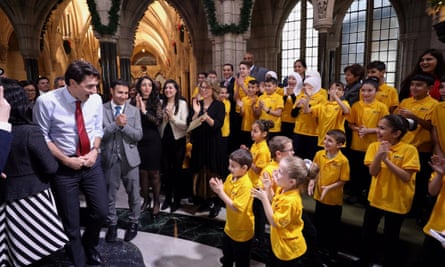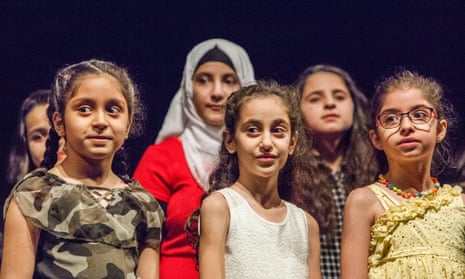A Canadian children’s choir made up mostly of recently arrived Syrian refugees has turned down an invite to perform at a prestigious international festival in the US over fears of crossing the border under the Trump administration’s travel ban.
Launched in 2016 as tens of thousands of Syrian refugees were arriving in Canada, the Nai Kids choir has been gathering weekly in Toronto to belt out a repertoire of English and French tunes along with Syrian favourites.
The choir has given its members the chance to make friends, practice their English and gain a foothold in their new home, said Fei Tang, the choir’s founder and general manager.
“I think the biggest thing they get is the sense of belonging,” Tang said. “Even though the general public is very sympathetic, because of the language barriers and cultural barriers, they could not blend in that quickly. The choir serves as a buffer.”
The choir has also become a refuge from constant worries over family members still in the Middle East and haunting memories of loss and destruction. Tang said: “We’re singing to give back.”
So far more than 200 children have been part of the choir, including newcomers from Yemen, Eritrea and Tunisia. These days it consists of about 60 children, ranging in age from five to 15, all of whom are from Syria.
They have rapidly become a homegrown hit; donning their yellow polo shirts and singing about peace, love and grief for prime minister Justin Trudeau and other MPs, as well as at festivals in Toronto.
But recently the choir was forced to turn down its most remarkable invitation so far: an all-expenses paid chance to perform at the Kennedy Center for the Performing Arts in Washington DC, as part of the Serenade choral festival.

When the invitation arrived in October, the choir did not immediately see the potential for complications. “We didn’t think about the visa situation at first. We were panicking about ‘we’re not good enough to be presented at the Kennedy Center’.”
They soon began canvassing immigration experts and other newcomers to find out how the visa process might work. Although most of the kids have lived in Canada for the past two years, Syria is among the five Muslim-majority countries targeted in Trump’s travel ban.
And other Canadians from the affected countries have reported being turned away at the border and warned that they would now have issues entering the US for the rest of their lives.
“The choir is very diverse,” said Tang. “Some kids have been in Canada longer, some kids have fair skin, they’re blond and Christian, they probably won’t have a problem. But what if our Kurdish children or children with hijabs got stopped at the border?”
The final straw was the story of a musical group who had ended up detained at the border for days after trying to cross into the US. “That’s not something we wanted to risk,” said Tang. “It’s just too much, given what these children already have been through.”
Organisations across Canada have made similar decisions in the wake of Trump’s travel ban, from the Girl Guides of Canada who last year cancelled all travel to the US to the Toronto district school board.
The Serenade festival – which has showcased more than 85 choirs from countries ranging from Norway to Zimbabwe in the past eight years – got under way this week, just as the US supreme court upheld the travel ban.
Neeta Helms, the founder and president of Classical Movements, the organisation behind the festival, said the choir’s decision to avoid crossing the border was understandable.
“We’re in kind of a difficult world right now. It’s definitely not easy to predict who will qualify for entry.”
Instead of performing, the choir will appear in a prerecorded video which will be shown at Kennedy Centre during the festival’s grand finale on Sunday.
The aim of the video is to reinforce to the children that politics – rather than personal feelings – are behind the decision to stay home, said Tang.
“Of course you don’t talk politics to the children, but when they asked why are we doing the recording, we said that Americans love you guys, they wanted you to be there. It’s just Mr Trump doesn’t want us to be there,” she said. “So we are sending our love through our songs.”
